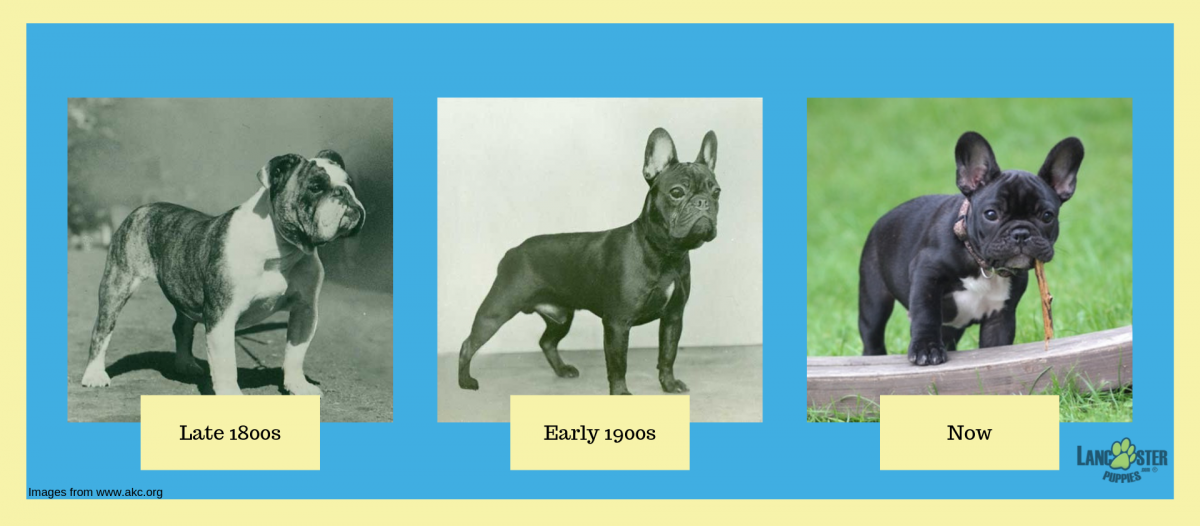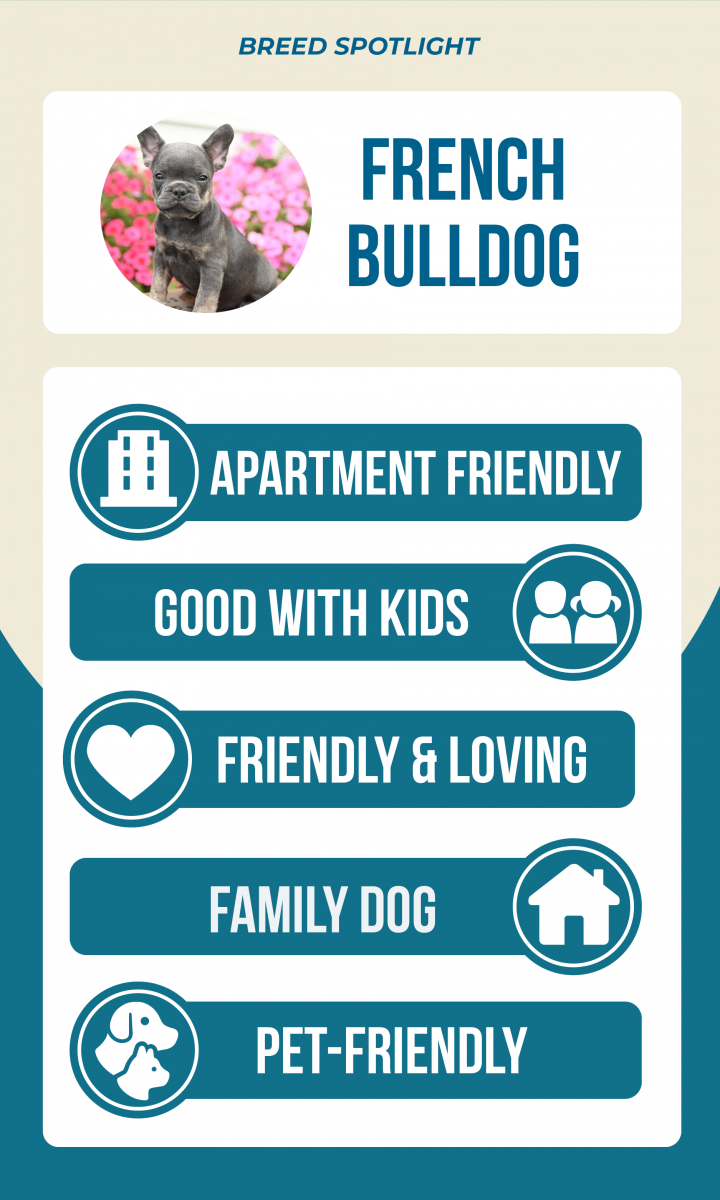Bat ears, a wrinkly face, a flat nose, and a playful disposition: these are just a few of the characteristics that make up the lovable, friendly French Bulldog. Over the past hundred years, Frenchies have been adored by many, making them one of the most popular dog breeds today.
Whether you’re a French Bulldog owner, considering adopting one, or just love the breed, keep reading for some background on the charming Frenchie.
French Bulldog History

Despite what its name may imply, the French Bulldog breed originated in England. Frenchies are descendants of English Bulldogs, who were used for bull-baiting. When activities like this were outlawed in England in 1835, the English Bulldog transitioned from a sporting breed to a companion breed.
To reduce their size, English Bulldogs were bred with smaller breeds, resulting in the Toy Bulldog. During the 1850s, Toy Bulldogs became increasingly popular in England and even started appearing in dog shows.
Meanwhile, during the height of the Industrial Revolution, lace workers from England began to relocate to Normandy, France. These workers brought a variety of dogs with them, and Toy Bulldogs were no exception.
The French adored the Toy Bulldogs, so English breeders began to send over more of the breed. By 1860, there weren’t many Toy Bulldogs left in England, but they were wildly popular in France.
Over time, the Toy Bulldog became a breed of its own and received its own name: the Bouledogue Francais, or French Bulldog in English. By the end of the 19th century, the French Bulldog’s popularity had spread from Europe to America, and Frenchies became adored by more and more people across the globe.
Characteristics of French Bulldogs
Temperament
The Frenchie’s affectionate, easygoing temperament is one of the most appealing features for many owners. Because they are so adaptable and friendly, French Bulldogs make great pets for first-time dog owners. They adjust well to other animals, and they are extremely kid-friendly.
On a scale of energy level, French Bulldogs fall somewhere in the middle. While they love to cuddle and sleep, they also enjoy playing and exercising. Frenchies also don’t bark much, making them great pets for apartment dwellers.
French Bulldogs are extremely sociable and thrive on human interaction, so they shouldn’t be left alone for extended periods of time. As long as they receive the attention and care they need, French Bulldogs make wonderful, easy companions for all types of people.
Health
Like humans, all dogs have the potential to develop health problems at any point during their lives. However, certain breeds are more susceptible to some health conditions more than others. French Bulldogs, for example, are especially prone to brachycephalic syndrome because of their flat face and nose.
The Frenchie’s facial structure can cause their airways to be obstructed to varying degrees. Depending on the severity of the condition, Frenchies may or may not need treatment for brachycephalic syndrome.
Another health condition that French Bulldogs are susceptible to is hip dysplasia: a condition in which the femur doesn’t fit properly into the pelvic socket, causing pain and discomfort in one or both of the dog’s rear legs. Keep in mind that hip dysplasia is often passed down from parents to their offspring. So, make sure that your Frenchie has been tested for hip dysplasia before you adopt him or her.
Appearance
One of the first things you’ll notice about French Bulldogs is their unique bat-like ears. Frenchies’ ears sit high on their head and are broad at the base, with a round, more narrow top. Their bodies are short, round, and typically around 10 to 13 inches tall. On average, a healthy French Bulldog will weigh between 24 and 30 pounds.
French Bulldogs’ coats are very short, fine, and soft, meaning they’re easy to groom. Frenchies come in a variety of different colors, such as cream, fawn, white, and various shades of brindle (a coat with specks and streaks of different colored fur). Despite rumors circulating about the value of specific coat colors vs. others, no coat color is rarer or worth more money than another.
Caring for a French Bulldog
A Frenchie’s Ideal Home

Frenchies are extremely adaptable and can adjust to many different home environments and lifestyles. Still, it’s important to note that French Bulldogs should be in a home where they aren’t by themselves very often. So, if you’re looking for a breed that can be left alone for long hours during the day, a Frenchie isn’t your best option.
Other than that, Frenchies are great dogs for families, singles, and seniors alike. They can get along with just about anyone, including other dogs. However, French Bulldogs that are not socialized with many other people or dogs during puppyhood may have a harder time adjusting.
Training Best Practices
In general, French Bulldogs are relatively easy to train. Since they’re very playful, Frenchies respond well to higher-intensity training. It’s best to train these pups in short sessions, as they may become distracted and lose interest if a training session is too long. Another thing to note is that Frenchies have a tendency to be a bit stubborn at times, so it’s very important to be patient and persistent with a French Bulldog puppy during training.
One of the first places to start when training a French Bulldog is with socialization. If a Frenchie puppy isn’t socialized at an early age, it will be difficult for them to be social later in life. When socializing French Bulldogs, be sure not to force this breed to interact with anyone - let them approach the new human or animal on their own.
House training is another important area in training a Frenchie, and you should start as soon as you bring your puppy home. When house training, effective communication with your French Bulldog is key. Verbal commands are a great place to start, and the smart Frenchie can catch onto them quickly. Be firm and direct with your pup, but reward them with treats and pets for good behavior.
As with most puppies, potty training a French Bulldog can be a bit challenging. It may be hard to know when your puppy needs to go to the bathroom, especially at first. Try to establish consistency by feeding your Frenchie at the same time every day, and pay attention to when he or she drinks water. Let your pup outside every hour or so, and give them praise and treats for going to the bathroom.
Exercise

In general, French Bulldogs don’t need a ton of exercise. However, they should still be taken on daily walks and get plenty of playtime, especially during puppyhood. Keep in mind that Frenchies are very sensitive to heat and humidity. Because of their facial structure, these dogs may have difficulty breathing if the weather is too hot, so be careful when exercising your Frenchie outside during the summertime.
Grooming and Hygiene
Frenchies have a short and fine coat, but they should still be groomed with a short-bristled brush on a weekly basis to minimize shedding. This breed doesn’t shed much compared to others, but French Bulldogs do lose a reasonable amount of fur during the spring and fall shedding seasons.
Because their hair is so short, Frenchies don’t need to be bathed more than once or twice a month, unless they get too muddy or dirty. When giving your Frenchie a bath, it’s best to use a gentle hypoallergenic shampoo, since this breed tends to have sensitive skin. It’s also not uncommon for French Bulldogs to develop dry skin, so use a moisturizing or conditioning shampoo on your pup every so often to keep their skin healthy and soft.
Want to adopt your very own French Bulldog puppy? Find the perfect Frenchie for you through Lancaster Puppies today!

